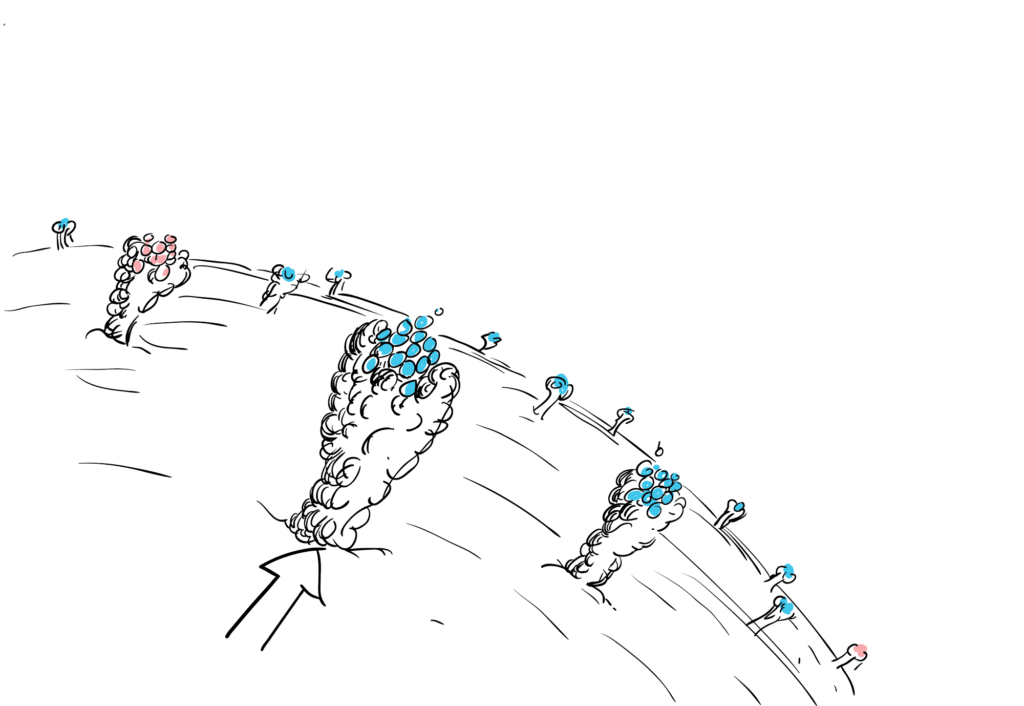Recent advances in immunotherapy have been ground-breaking in oncology, leading to durable responses in some patients with advanced disease. However, the sad fact remains that most cancers do not respond to these therapies. Clinical data generated over the last few years have shown that the visibility of a tumour to the immune system is one of the key determinants of whether cancer will respond to treatment.
Tumours presenting a high number of non-self cell surface markers (neoantigens) are exquisitely sensitive to T cell checkpoint therapy because they are more likely to be recognized as ‘foreign’. However, the vast majority of cancers have low neoantigen expression and, as such, are non-responsive to immunotherapy. To create the next step change in oncology therapy there is an absolute requirement for a new generation of therapies that address the tumour visibility problem.
Endoplasmic Reticulum Associated Protease 1 (ERAP1) is a key protein in the antigen presentation pathway that has been shown to edit the antigen repertoire within tumour cells. Genome-wide association studies provide strong support for the role of ERAP1 in antigen modulation in disease and overexpression in certain tumour types.

Grey Wolf Therapeutics has demonstrated that oral dosing of different ERAP1 inhibitors leads to tumour growth inhibition, in combination with standard of care therapies, including immune checkpoint inhibition, across several different syngeneic tumour models. Single antigen systems and state of the art immunopeptidomic analyses show clear dose responsive effects of ERAP1 modulation on antigen presentation across species, cell types and genetic backgrounds both in vitro and in vivo. Critically, ERAP1 inhibition leads to the generation of novel neoantigens and upregulation of pre-existing neoantigens.
The comprehensive drug discovery screening cascade and preclinical program developed by Grey Wolf led to the nomination of an ERAP1 inhibitor development candidate, GRWD5769, that has completed preclinical development and will commence clinical trials in 2023.
Modulators of ERAP1 activity have the potential to offer a new treatment paradigm in oncology by significantly altering the neoantigen presentation on the surface of tumour cells leading to their increased recognition and destruction by the immune system.
Grey Wolf is also developing inhibitors that target Endoplasmic Reticulum Associated Protease 2 (ERAP2), a homologue of ERAP1. The activity of ERAP2 complements ERAP1 due to distinct differences in substrate specificity. As such, they are non-redundant enzymes in the antigen presentation pathway meaning inhibition of one enzyme cannot be compensated for by the activity of the other.

ERAP1 typically processes peptides that contain hydrophobic residues at the N-terminus, whereas ERAP2 has been shown to process shorter peptides, with a preference for positively charged Lys and Arg residues at the N-terminus. Inhibition of ERAP2 is therefore likely to lead to entirely novel effects on the immunopeptidome.
ERAP2 is less well characterised compared to ERAP1 due to its absence in rodents. In humans, there are two common alleles of ERAP2, one of which leads to a functional knockout of the enzyme and is surprisingly prevalent in persons of European descent, suggesting the two alleles are maintained in balancing selection.
Recent data suggests that the shortened form of ERAP2 provides protection from viral infection such as COVID-19 and influenza. The importance of ERAP2 is further highlighted by its genetic association with cancer and immune-related diseases such as ankylosing spondylitis (AS), birdshot chorioretinopathy, and psoriasis.

The generation of novel cancer antigens following ERAP inhibition unlocks an entirely new area of major histocompatibility complex (MHC) class I (MHCI) directed therapeutic targets, that are only accessible following ERAP inhibition. This approach provides a unique therapeutic platform for the generation of ERAP inhibitor / MHCI-directed therapy combinations.
Compelling preclinical proof of concept data has clearly demonstrated the potential of combining ERAP inhibition with specific MHCI directed therapies, such as soluble T cell receptor (TCR) or TCR mimic bispecifics. By mining a wealth of proprietary immunopeptidomic data, Grey Wolf are selecting key cancer antigen targets for therapeutic development in combination with ERAP1 inhibition.
Grey Wolf’s core team of drug discovery and development professionals is further strengthened by a network of collaborations with experts in immuno-oncology, antigen presentation and drug discovery across world leading academic institutions and CROs, including University of Oxford, Monash University, University of Southampton and Sygnature Discovery. Grey Wolf is focused on understanding the potential of modulating ERAP in immuno-oncology and will enter the clinic with the lead program targeting ERAP1 in the first half of 2023.